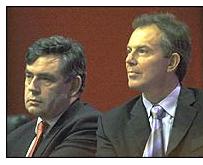
As the Blairites start to take their
revenge on Gordon Brown for the week's shenangigans,
Guido has asked his legions of readers for their help in identifying the Cabinet minister who told Nick Robinson that Brown
"would be a fucking dreadful Prime Minister and I will do all in my power to stop him."Well, I'm happy to lend a hand as it's a question that's been buzzing round in my mind too.
Going through the Cabinet list one-by-one, the following can be ruled out because they are bascially friends or supporters of Gordon: Prescott, Straw, Beckett, Darling, Hain, Alexander, Browne, Hewitt and Timms.
Meanwhile the following can be ruled out because they are too nice to use words like fuck - at least in public: Kelly, Miliband, Armstrong, Jowell, Amos, Benn and Smith.
Which to my mind leaves five prime suspects in the frame: Reid, Johnson, Falconer, Blears and Hutton.
Taking these in turn, Reid would seem to be the hot favourite, both on account of his well-documented views on Gordon and occasionally belligerent nature. But there's one problem - he was out of the country yesterday, and this exchange with Robinson has the air of something uttered to his face rather than over the phone.
What about Johnson, then? Well, it's the kind of thing he might have said, but he has been playing his cards very close to his chest with regard to the leadership, and I find it unlikely he would have used words to Robinson which would effectively confirm his candidature.
Blears? I'll say this much - she's the only Cabinet woman you can imagine making such a remark, and she's no fan of the Chancellor either. But it still sounds like a blokey comment to me, and Blears, as party chairman, will be aware of the need for her to remain publicly above the fray.
What about Falconer? Now I think we're possibly getting warmer. Some would say he's too urbane to use the f-word, but in my experience posh lawyers are just as foul-mouthed as their more humble counterparts. And with his Cabinet career at an end if Brown takes over, he certainly has the motive.
Finally, Hutton. He's often thought of as Mr Geniality but he sounded pretty tetchy to me on the Today Programme yesterday, especially when asked about whether he endorsed Gordon for leader. Maybe he's picked up some bad habits from his former flatmate Alan Milburn who swears like a trouper. Particularly about Gordon.
So there it is. But there's a serious point here too, in that if this the kind of thing the Blairites are saying about Gordon, then it is clear he is now facing a concerted attempt to block him, with all the consequential risks of a lasting split in the party if that effort succeeds.
You can be sure of one other thing, too. That Gordon's people will also be doing their damnedest to find out who said it.
****
To round off a hectic week's blogging, here's a couple of other things that caught my eye today.
First, Times Political Editor
Philip Webster's front page story on the crisis, which contains the intriguing paragraph:
"But Mr Brown appeared to be the unassailable favourite to succeed Mr Blair as one minister after another offered support to the Chancellor."As any fule kno, at least at Westminster, the word "unassailable" has long been a political code-word for someone who is about to be sacked - after Margaret Thatcher used it about her soon-to-be-departing Chancellor Nigel Lawson in 1989.
Was this just Webster's little joke? Or was it possibly something more sinister, a warning to Brown delivered via one of the Blair camp's most trusted scribes that he is riding for an almighty fall?
Finally, the Blair fightback continues with the establishment of a new website,
Keeping the Faith, dedicated to defending the PM against the "minority" of MPs who are trying to dethrone him.
Among those who have signed the online petition are Adrian McMenamin, the combative former Labour press officer whose job used to involve infiltrating the opposition parties' conferences and instantly rebutting any attack on New Labour, and Darren Murphy, the former Milburn SPAD who went on to become Mr Blair's political secretary.
But for a brilliant deconstruction of the site and the people behind it, I hereby direct you to
this piece on Bloggerheads.
Tim "Manic" Ireland's twisted humour is quite frequently beyond me. But he has played an absolute blinder on this one.

 Conventional wisdom has it that the next General Election will take place in 2009. Indeed Jack Straw seemed to suggest this last week when he said Tony Blair would be stepping down at the "mid-point" of the current Parliament.
Conventional wisdom has it that the next General Election will take place in 2009. Indeed Jack Straw seemed to suggest this last week when he said Tony Blair would be stepping down at the "mid-point" of the current Parliament.



